2020 SkS Weekly Climate Change & Global Warming Digest #3
Posted on 19 January 2020 by John Hartz
Story of the Week... Editorial of the Week... Toon of the Week... Quote of the Week... Graphic of the Week... Coming Soon on SkS... Climate Feedback Claim Reviews... SkS Week in Review... Poster of the Week...
Story of the Week...
'It's heart-wrenching': 80% of Blue Mountains and 50% of Gondwana rainforests burn in bushfires
Guardian Australia analysis reveals the frightening amount of world heritage area burned in Australia’s ongoing fire crisis
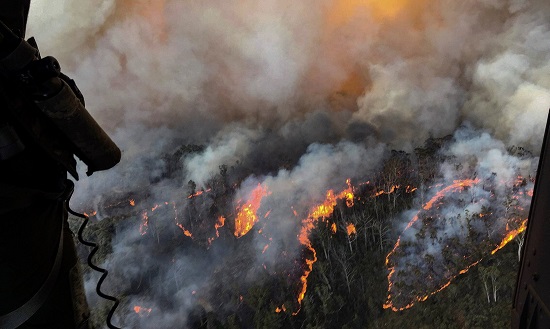
The unprecedented bushfires could affect the diversity of eucalypts for which the Blue Mountains is recognised. Photograph: CPOA Brett Kennedy/Commonwealth of Australia/PA
At least 80% of the Blue Mountains world heritage area and more than 50% of the Gondwana world heritage rainforests have burned in Australia’s ongoing bushfire crisis.
The scale of the disaster is such that it could affect the diversity of eucalypts for which the Blue Mountains world heritage area is recognised, said John Merson, the executive director of the Blue Mountains World Heritage Institute.
The data is based on a Guardian Australia analysis of areas burned in New South Wales and Queensland and was confirmed by the NSW government.
'It's heart-wrenching': 80% of Blue Mountains and 50% of Gondwana rainforests burn in bushfires by Lisa Cox & Nick Evershed, Environment, Guardian, Jan 16, 2020
Click here to access the entire article as originally published on The Guardian website.
Editorial of the Week...
Grief, frustration, guilt: the bushfires show the far-reaching mental health impacts of climate change
Loss of property, hazardous air and reduced food security has transitioned into mass eco-anxiety
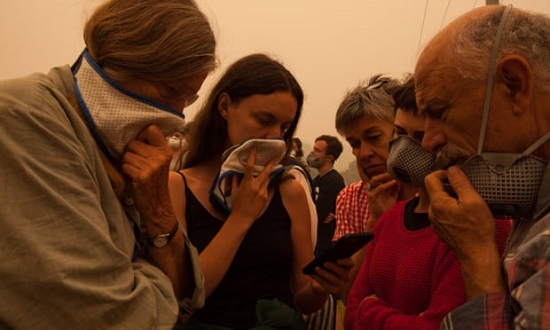
Mallacoota residents listening to a phone call from neighbours who fled before the fires hit. Loss of homes and associated identity as well as poor air quality are major risk factors for mental illness. Photograph: Rachel Mounsey/The Guardian
The bushfires that have ravaged large parts of Australia since September 2019 have resulted in a scale of destruction that will take years, if not decades, of recovery.
The mammoth task that will be Australia’s national bushfire recovery has garnered financial support from numerous private donors and a $2bn commitment from the federal government, including a $76m package allocated to mental health services for affected persons. So what exactly are the expected mental health impacts of the bushfires?
To try and anticipate the direct mental health impacts from the current bushfires, one can look to research conducted after the Black Saturday bushfires of 2009.
Grief, frustration, guilt: the bushfires show the far-reaching mental health impacts of climate change, Opinion by Fiona Charlson*, Comment is Free, Guardian, Jan 16, 2020
*Dr Fiona Charlson is a post-doctoral research fellow at the University of Queensland specialised in global mental health
Click here to access the entire opinion piece as originally posted on The Guardian website.
Toon of the Week...
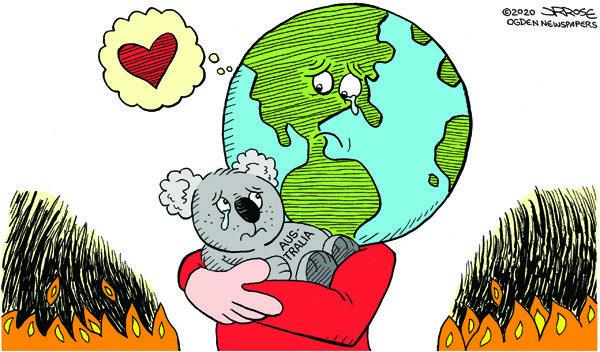
Hat tip to the Stop Climate Science Denial Facebook page.
Graphic of the Week...
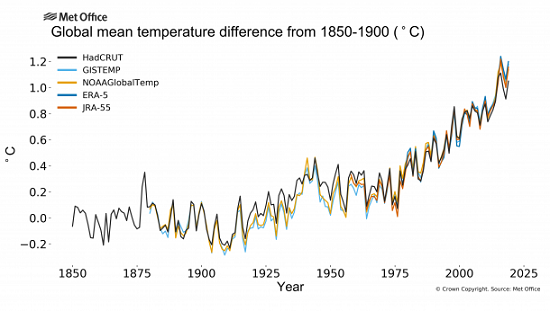
WMO confirms 2019 as second hottest year on record, Press Release, World Meteorological Organization (WMO), Jan 15, 2020
Coming Soon on SkS...
- Australia's heat and bushfires are signs of fundamental shifts in its climate (Peter Sinclair)
- How did climate change get so controversial? (John Cook)
- Skeptical Science New Research for Week #3, 2020 (Doug Bostrom)
- Waking up to climate change | Australia's Bushfires (Climate Adam)
- What psychotherapy can do for the climate and biodiversity crises (Caroline Hickman)
- 2019 SkS Weekly Climate Change & Global Warming News Roundup #4 (John Hartz)
- 2019 SkS Weekly Climate Change & Global Warming Digest #4 (John Hartz)
Climate Feedback Claim Reviews...
Facebook meme incorrectly claims past climate variations contradict human influence on current climate
CLAIM: "The idea that 'climate change' is new or is caused by Humans is nonsense."
SOURCE: Anonymous, Facebook, 2 Jan. 2020
VERDICT: ![]()
KEY TAKEAWAY: Many lines of evidence have enabled scientists to conclude that humans are responsible for global warming. Physics dictates that increased concentrations of greenhouse gases in the atmosphere trap additional heat in Earth's climate system, and human-caused emissions of greenhouse gases have increased those concentrations. Climate has changed in the past for a number of reasons, and studying those events helps scientists understand the way the climate system works.
Facebook meme incorrectly claims past climate variations contradict human influence on current climate, Edited by Scott Johnson, Jan 13, 2020
Poster of the Week...
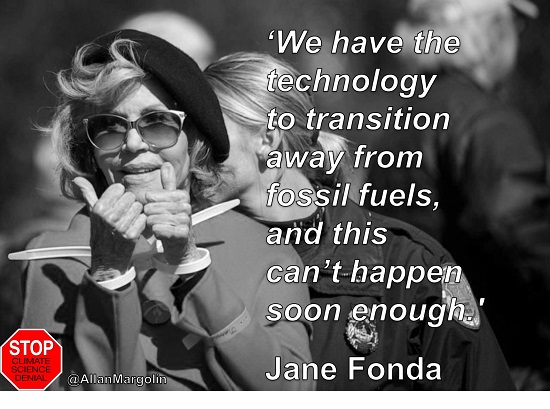
;Hat tip to the Stop Climate Science Denial Facebook page.
SkS Week in Review...
- 2020 SkS Weekly Climate Change & Global Warming News Roundup #3 by John Hartz (SkS Original)
- How climate change influenced Australia's unprecedented fires by Dana Nuccitelli (Yale Climate Connections Repost)
- Skeptical Science New Research for Week #2, 2020 by Doug Bostrom (SkS Original)
- 'Cranky Uncle' smart phone game will show you how to disarm climate deniers by Bud Ward (Yale Climate Connections)
- I had an intense conversation at work today. by Claire Cohen-Norris (SkS Original)
- 2020 SkS Weekly Climate Change & Global Warming Digest #2 by John Hartz (SkS Original)































 Arguments
Arguments






























Comments